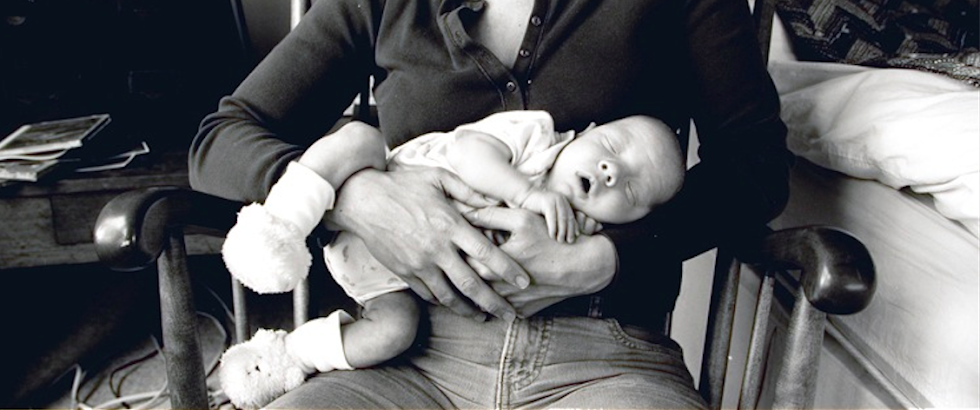I want to send my friend Emily and her son Ronan all the super mojo, good vibes and virtual love possible for the struggles they both face—struggles that no child or parent should ever have to encounter. And so, in their honor, I am reposting the following piece:
A new friend, Emily, whom I’ve never met in person, has a two year old son named Ronan who was diagnosed with the regressive, terminal disease, Tay-Sachs, when he was just nine months old. From what she’s written, it seems he likely hasn’t got long to live. I think of her and Ronan daily, sometimes hourly, and check in on Facebook and her blog Little Seal, to steal glimpses of her beautiful boy and to immerse myself in the poignant words she writes about life with her precious son.
A new friend, Emily, whom I’ve never met in person, has a two year old son named Ronan who was diagnosed with the regressive, terminal disease, Tay-Sachs, when he was just nine months old. From what she’s written, it seems he likely hasn’t got long to live. I think of her and Ronan daily, sometimes hourly, and check in on Facebook and her blog Little Seal, to steal glimpses of her beautiful boy and to immerse myself in the poignant words she writes about life with her precious son.
I sometimes read what others write in response to her blog posts. Most entries are compassionate and understanding, often written by parents of ill children. One reader posted this comment:
Jeremiah 29:11
“For I know the plans I have for you,” declares the LORD, “plans to
prosper you and not to harm you, plans to give you hope and a future.”
Not to harm you? I think. I bristle at the words, the false image they conjure in my mind while contemplating my own son Calvin’s tragic health and developmental difficulties. I wonder if these words can possibly soothe her or whether they simply cut her to the bone—like they often do to me—grind salt into a gaping wound that she and her boy have inexplicably sustained. That’s how I still feel sometimes when well-wishers ignorantly toss their belief systems in my face—like a bitter pie—thinking somehow they know better than I the cause and/or destiny of my sick child, thinking their words will serve to make me feel better. The only sense I can make of comments like that—which I know are meant to console—is that they mostly serve to comfort the individual offering them, in an effort to make some sense of the incomprehensible tragedy of a sick and dying child. I'm not saying that the intention is wrong, but perhaps better kept to one's self.
When I tell people about Calvin and our struggles, about life's uncertainties raising a child whose brain isn’t complete and who suffers repeated seizures for which he must ingest copious drugs that have yet to succeed at stopping them, some tell me it's God's will and others tell me that I am brave.
Brave? No. Scared shitless? Yes. At times literally shaking in my boots. Bravery has little to do with being the mother of a chronically ill child, who at times seems to live on a thread of existence. We just do what we do, move through one moment to the next hoping that will make the future seem less daunting, less all-consuming, less suffocating, less hopeless. What else can we do but indefatigably love and care for and cherish our children as if there is no tomorrow—because maybe there won't be? It’s not called bravery; it’s called motherhood. And yes, it's likely there are a select few who'd abandon the challenge of caring for kids like ours, abandon the grief, the strife—their children—but perhaps not because they aren't brave but because they aren't strong. They aren't Dragon Moms, to use the term Emily so effectively coined, the term that I think perfectly describes the way I often feel.
When I read Emily’s words and view the muted, acid-tinted, dreamlike photographs of her son, what I see is not a brave woman but one with the grace of ages. If I let my mind wander she appears as a barefoot nymph with blushing skin and shining rosegold locks, her body loosely draped in a simple gossamer gown, Ronan gently cradled in her arms—a pure embodiment of grace. I see her loving embrace of Ronan—the way she delicately supports her son’s head with slender fingers just at the back of his little bird neck, like I used to do with Calvin. I see grace in the way her gaze seems to linger on him as if it would never end. I see grace in her reply to a stranger’s ignorant, probing questions about her dying child. Hell, I know I'd even see grace in her bitterness, her bark and her bite, her firebreathing struggle, in her grief, sorrow, despair, anger, self-pity. Because grace is honest and true, grace is unapologetic, grace cannot be put on.
And so we, mothers of these innocents who suffer, move forward one step at a time, perhaps gracefully, but only hoping to be brave.
Originally published 11.02.11.
Please share.


Just found your blog and have read my way almost all the way through it in the last few days. My son has a different and less severe disability, but I can relate to so much of what you write. We do what we have to do for our children. We celebrate their achievements and grieve for what they cannot do and try our best with them every day. When we fall short, we pick ourselves up and try again, out of love. Proud to be a fellow Dragon Mom (love that!) and wishing you grace.
ReplyDelete